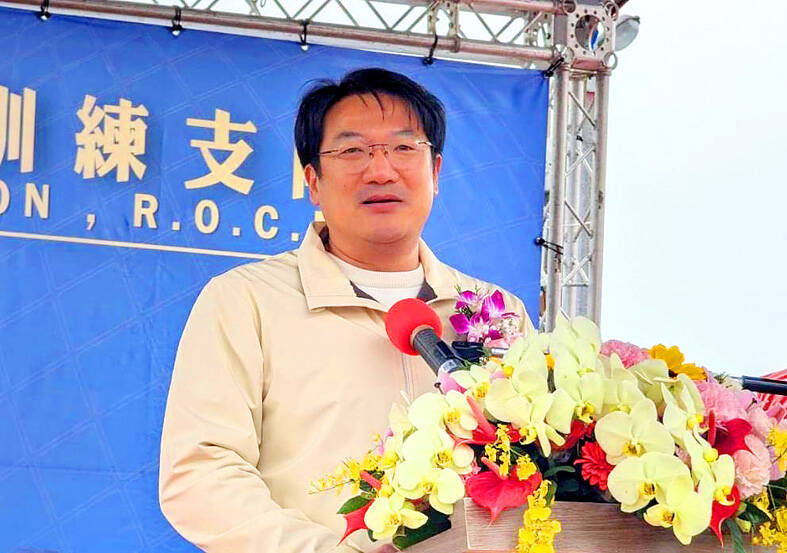The Keelung District Prosecutors’ Office yesterday requested that a court detain three people, including Keelung Department of Civil Affairs Director Chang Yuan-hsiang (張淵翔), in connection with an investigation into forged signatures used in recall campaigns.
Chang is suspected of accessing the household registration system to assist with recall campaigns targeting Democratic Progressive Party (DPP) city councilors Cheng Wen-ting (鄭文婷) and Jiho Chang (張之豪), prosecutors said.
Prosecutors on Monday directed investigators to search six locations, including the Chinese Nationalist Party’s (KMT) Keelung office and the residences of several recall campaign leaders.

Photo: CNA
The recall campaign leaders — Chi Wen-chuan (紀文荃), Yu Cheng-i (游正義) and Hsu Shao-yeh (許紹業) — were summoned as suspects in relation to the forgery investigation.
Prosecutors also questioned Renai District (仁愛) KMT committee director Chang Chin-fa (張金發), committee chairman Wu Kuo-sheng (吳國勝), first division secretary Hsiao Chuang-feng (蕭壯峰) and party office secretary-general Lee Ming-yi (李銘議).
Hsiao and Lee were released without bail, but Wu and Chang Chin-fa were reclassified as suspects and taken to the prosecutors’ office for more questioning.
Chang Yuan-hsiang was then summoned by prosecutors, who said they suspect he used his access to the household registration system to assist the recall campaign in finding personal information.
Prosecutors requested that the Keelung District Court detain Chang Yuan-hsiang, Chi and Chang Chin-fa on suspicion of contravening the Personal Data Protection Act (個人資料保護法), forging documents and destroying evidence.
Wu, Yu and Hsu were released on NT$300,000, NT$150,000 and NT$30,000 bail respectively.
In New Taipei City, the district court ordered that KMT New Taipei City branch secretary-general Chen Chen-jung (陳貞容) be detained and held incommunicado after being questioned for more than two hours, the New Taipei District Prosecutors’ Office said yesterday.
Authorities on Monday raided the party’s New Taipei City office and the residences of three people, including Chen, in connection with investigations into the use of forged signatures in recall campaigns against DPP lawmakers.
KMT Banciao office secretary Chu Pei-yi (朱蓓儀), KMT Sanchong District (三重) office executive director Lo Ta-yu (羅大宇) and Banciao party secretary Tsai Kan-tzu (蔡甘子) were released after questioning.
The searches on Monday included the KMT’s New Taipei City branch and followed earlier raids on April 15 targeting 30 locations, including the KMT’s Banciao and Sanchong branches.
KMT New Taipei City branch chairman Huang Chih-hsiung (黃志雄) criticized Chen’s detention as politically motivated and said the party would definitely file an appeal.
Huang said it was “incomprehensible” that prosecutors would initiate a second round of searches and questioning without presenting new evidence.
He also said that the court’s approval of the detention order after a “short one hour” hearing raised further concerns about the fairness of the proceedings.
Additional reporting by Lin Chia-tung and Wu Sheng-ju

The US government has signed defense cooperation agreements with Japan and the Philippines to boost the deterrence capabilities of countries in the first island chain, a report by the National Security Bureau (NSB) showed. The main countries on the first island chain include the two nations and Taiwan. The bureau is to present the report at a meeting of the legislature’s Foreign Affairs and National Defense Committee tomorrow. The US military has deployed Typhon missile systems to Japan’s Yamaguchi Prefecture and Zambales province in the Philippines during their joint military exercises. It has also installed NMESIS anti-ship systems in Japan’s Okinawa

‘WIN-WIN’: The Philippines, and central and eastern European countries are important potential drone cooperation partners, Minister of Foreign Affairs Lin Chia-lung said Minister of Foreign Affairs Lin Chia-lung (林佳龍) in an interview published yesterday confirmed that there are joint ventures between Taiwan and Poland in the drone industry. Lin made the remark in an exclusive interview with the Chinese-language Liberty Times (the Taipei Times’ sister paper). The government-backed Taiwan Excellence Drone International Business Opportunities Alliance and the Polish Chamber of Unmanned Systems on Wednesday last week signed a memorandum of understanding in Poland to develop a “non-China” supply chain for drones and work together on key technologies. Asked if Taiwan prioritized Poland among central and eastern European countries in drone collaboration, Lin

ON ALERT: Taiwan’s partners would issue warnings if China attempted to use Interpol to target Taiwanese, and the global body has mechanisms to prevent it, an official said China has stationed two to four people specializing in Taiwan affairs at its embassies in several democratic countries to monitor and harass Taiwanese, actions that the host nations would not tolerate, National Security Bureau (NSB) Director-General Tsai Ming-yen (蔡明彥) said yesterday. Tsai made the comments at a meeting of the legislature’s Foreign Affairs and National Defense Committee, which asked him and Minister of National Defense Wellington Koo (顧立雄) to report on potential conflicts in the Taiwan Strait and military preparedness. Democratic Progressive Party (DPP) Legislator Michelle Lin (林楚茵) expressed concern that Beijing has posted personnel from China’s Taiwan Affairs Office to its

BACK TO WORK? Prosecutors said they are considering filing an appeal, while the Hsinchu City Government said it has applied for Ann Kao’s reinstatement as mayor The High Court yesterday found suspended Hsinchu mayor Ann Kao (高虹安) not guilty of embezzling assistant fees, reducing her sentence to six months in prison commutable to a fine from seven years and four months. The verdict acquitted Kao of the corruption charge, but found her guilty of causing a public official to commit document forgery. The High Prosecutors’ Office said it is reviewing the ruling and considering whether to file an appeal. The Taipei District Court in July last year sentenced Kao to seven years and four months in prison, along with a four-year deprivation of civil rights, for contravening the Anti-Corruption